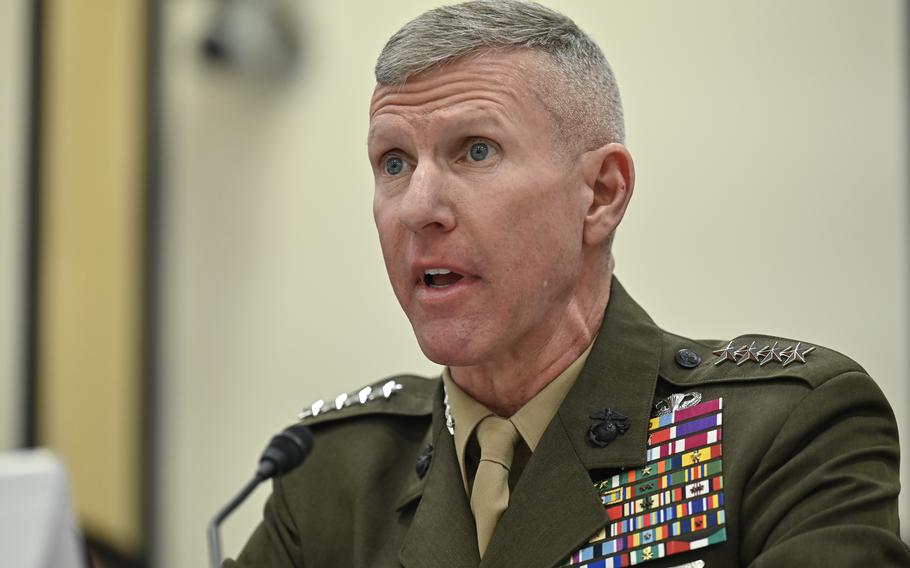
Gen. Eric Smith, assistant commandant of the Marine Corps, testifies April 19, 2023, before the House Armed Services Committee subpanel on readiness about the fiscal 2024 budget for the Marine Corps. (Eric Dietrich/U.S. Air Force)
WASHINGTON — Gen. Eric Smith moved one step closer to becoming the top officer in the Marine Corps after the Senate Armed Services Committee on Wednesday approved his nomination as the next commandant of the service.
The committee also voted for the nomination of Maj. Gen. Leonard Anderson to be commander of the Marine Forces Reserve and Marine Forces South. The committee held voice votes on the nominations, and they received no objections.
Both generals now must be confirmed by the full Senate. This remains a challenge as Sen. Tommy Tuberville, R-Ala., continues to block the Senate from making standard voice votes to approve military promotions over his objection to a Pentagon policy that provides travel money to troops for reproductive health care, including abortions. The nominees can be confirmed by the Senate one by one in a process that would consume months of the upper chamber’s floor time.
Sen. Tommy Tuberville, R-Ala., attends a Capitol Hill news conference on June 14, 2023. (Joe Gromelski/Special to Stars and Stripes)
During Smith’s nomination hearing last week before the Senate Armed Services Committee, the general told senators that Tuberville’s blocking of hundreds of military promotions could have an effect on national security.
“It certainly compromises our ability to be most ready,” Smith said. “Our readiness is national security.”
The four-star general said the blocked promotions, which include more than 200 military officers, have an impact on readiness, decision making and the effectiveness of the units hindered by the delays.
“We live in a dangerous world,” Tuberville told Smith at the hearing. “And I would hope some of your colleagues in the Pentagon would catch on to that a little bit and get politics out of this. I mean, politics is detrimental to a lot of things. It’s good for some things, some things it’s not. For the military, it’s not.”
Smith, 58, was nominated by President Joe Biden last month to be the 39th commandant of the Marine Corps when Gen. David Berger retires next month. He’s been assistant commandant since late 2021. As commandant, Smith would be the service’s highest-ranking officer and a member of the Joint Chiefs of Staff.
Defense Secretary Lloyd Austin wrote a letter to Sen. Elizabeth Warren, D-Mass., last month that warned about the ripple effects from Tuberville’s block and that the Defense Department expects to send about 650 general and flag officer nominees by the end of the year.
“These holds set a dangerous precedent and put our military readiness at risk at a time when our military is expected to defend the nation, meet the acute threat of Russia and adjust the pacing challenges of [China],” Deputy Pentagon Press Secretary Sabrina Singh told reporters Tuesday.
But Tuberville argued in a Washington Post opinion piece published Thursday that is not the case.
“My hold is not affecting readiness. Acting officials are in each one of the positions that are due for a promotion,” Tuberville wrote. “The hold affects only those at the very top — generals and flag officers. The people who actually fight are not affected at all.”